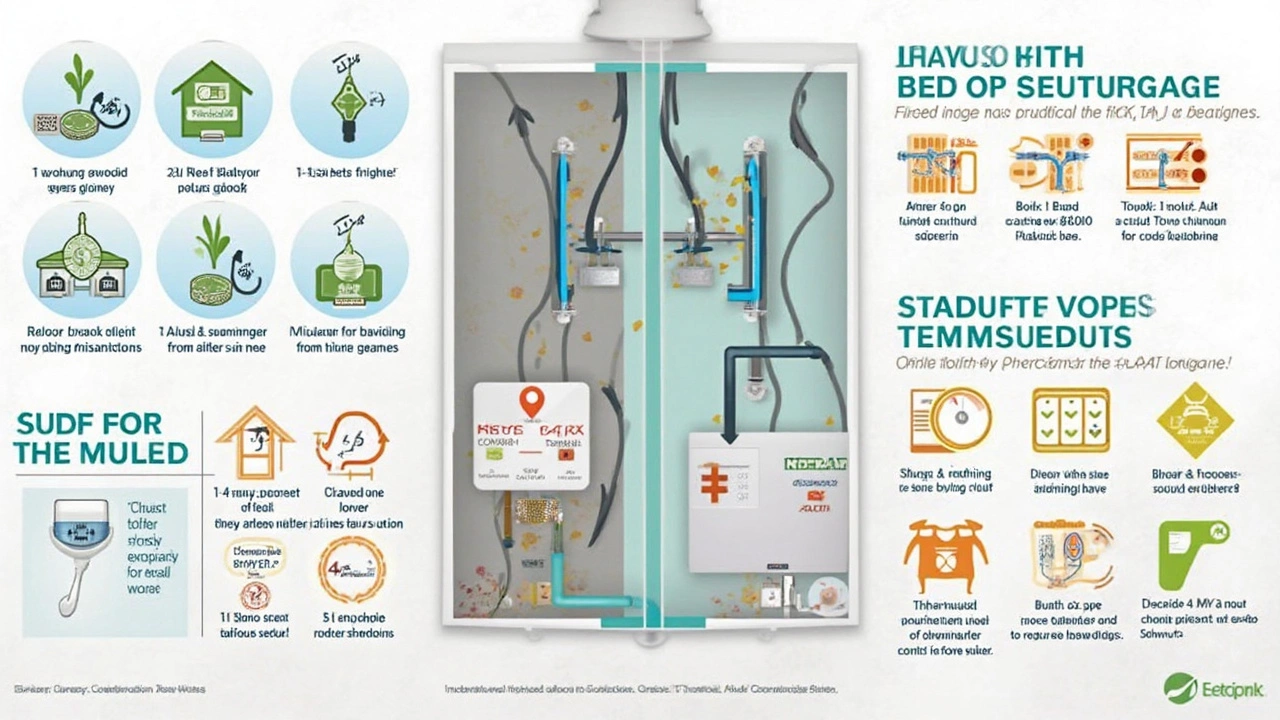Ever stood by your boiler, finger hovering over the switch, and wondered if flicking it off and on will ruin it? You’re not alone—lots of folks worry about wearing out their boiler by shutting it down too often. Boilers aren’t like old school lightbulbs that burn out just from being switched; they’re designed to handle start-ups and shut-downs.
Still, there’s a bit more to it. Some parts of the boiler, like the ignition and pumps, do take a bit of extra strain every time you power down and fire them back up. But it’s not the switching itself that’s a major problem for most modern units. Problems usually creep in when switching is constant—like multiple times every day—or when the boiler is already in rough shape because of poor maintenance.
If your main goal is to save money or energy, you might actually help your boiler (and bills) by shutting it off during long periods you’re away, like summer vacation. But, there are smart ways to do it that can extend your boiler's lifespan and keep you from calling for expensive repairs.
- How Boilers Handle Being Turned On and Off
- Why People Frequently Switch Boilers
- What Actually Damages Boilers
- Smart Boiler Usage: Tips and Myths
- When to Call a Pro
How Boilers Handle Being Turned On and Off
Boilers these days are built to start and stop without throwing a fit. When you hit that power button, your boiler's ignition system fires up pretty quickly—usually under a minute—and sensors make sure everything runs safely. Shutting it off is just as controlled; pumps and fans keep moving for a bit after shutdown to cool things down and clear out any leftover heat or fumes.
The most common worry people have is about "short cycling"—that’s just a fancy term for turning the boiler on and off more often than needed. Short cycling wears out moving parts like pumps, the fan, and especially the ignition. On many models, the actual wear from one normal start or stop is tiny. But do it ten times in an hour and you’re looking at a possible repair bill way sooner.
Newer boilers are a bit easier on themselves than the older ones. Many have built-in protections: some won’t even let you restart right away, making you wait a few seconds to prevent accidental rapid cycling. Condensing models, which are super common in the UK, are designed with better seals and smarter sensors, so flipping the switch occasionally isn’t the end of the world.
To put things in perspective, here’s a quick look at typical start-stop lifespans for boiler parts:
| Boiler Part | Expected Start-Stop Lifespan |
|---|---|
| Ignition electrode | 50,000 cycles |
| Pump | 40,000 cycles |
| Main PCB (control board) | 80,000 cycles |
If you’re running your boiler reasonably—maybe once or twice a day—it’s just doing its job. If you’re switching it all the time to chase a lower bill or out of habit, that’s when those cycles start to add up. The real sweet spot is using your boiler repair know-how to balance savings with common sense—let it do its thing, but don’t be afraid to give it a rest when you’ll be away for a while.
Why People Frequently Switch Boilers
Most folks end up turning their boilers on and off a lot to save money, save energy, or just to keep things comfortable at home. You might leave the house during the day, head out for a weekend, or even take a long trip. Nobody wants to heat an empty place, right?
Some people also switch their boilers off at night, thinking they’ll save on bills or avoid waking up to a sweltering bedroom. With energy prices always in the headlines, this feels like an easy move. According to surveys by the UK’s Energy Saving Trust, households who leave their boilers on low all day don’t actually save more energy than those who flick them on just when heat’s needed. That rubs against the old myth that “leaving it on is cheaper.”
Another reason? Worry about wear and tear. Some believe frequent shut-downs stretch out the boiler’s boiler repair intervals, while others fear it’ll do the opposite. Truth is, modern boilers are built with sensors and controls designed for cycling—especially combi and condensing models found in newer homes.
There’s also the issue of noise or odd smells. When you notice your boiler making a loud bang or any weird noise on start-up, you're more likely to switch it off until you get it checked out. Sometimes the cause is just a hiccup in the ignition or air trapped inside, but it’s smart to play it safe.
So, people switch boilers off for comfort, savings, safety, or out of habit. But it’s worth knowing when it actually makes a difference—so you’re not just flipping switches for the fun of it.

What Actually Damages Boilers
So, what really messes up a boiler? It’s usually not just turning it off now and then. The main problems hit when you ignore regular care or the system runs with issues for too long. Let’s break it down in simple terms.
- Lack of Maintenance: Skipping annual servicing lets grime, sludge, and limescale build up inside. This makes your boiler work overtime, and things get worn out faster.
- Low Water Pressure: If your boiler’s pressure is too low, it can’t move hot water around properly. Some newer boilers shut off to avoid damage, but older ones just struggle along and get damaged inside.
- Corrosion: Water and metal aren’t best friends. Over the years, rust can eat away at the inside, especially if there’s a slow leak or the water is hard.
- Overheating or Short Cycling: When a boiler turns on and off every few minutes (called short cycling), the parts heat up and cool down for no good reason. This is bad for the heat exchanger, the pump, and the controls.
- Blocked Condensate Pipe: Especially in winter, water can freeze in the condensate pipe, causing the boiler to stop or even flood parts inside. This is a common call-out, and it can do real damage if ignored.
Want some real numbers? Take a look at this table that shows the most common causes of boiler repair calls in the UK over the last year:
| Cause | % of Boiler Failures |
|---|---|
| Lack of maintenance | 32% |
| Corrosion/Leaks | 23% |
| Pressure issues | 18% |
| Thermostat/Faulty Controls | 15% |
| Condensate pipe blockages | 12% |
So, flipping your boiler off and on here and there won’t ruin it. But letting these other issues slide? That’s how you end up reaching for the repairman’s number and dropping real money.
Smart Boiler Usage: Tips and Myths
People tend to repeat advice about boilers that isn’t always right. So, here are the real facts about how to use your boiler smartly—and avoid those annoying repair bills.
First off, it’s a myth that turning your boiler on and off daily will instantly kill it. Most modern boilers are built to start up and shut down without much fuss. The real issue is boiler maintenance, not how often you power it off, unless you’re doing it nonstop.
- Don’t switch off for short periods: If you’re leaving the house for a day, just lower the thermostat instead of shutting the whole thing off. Constantly going from cold to hot stresses some internal parts and can eat into efficiency.
- Long trips are different: Heading on vacation for a week or more? Turning off the boiler could save energy—unless it’s freezing outside. Pipes can freeze and burst, which is far worse than a slightly higher bill.
- Program your timer: Most boilers have a built-in timer. Set it to only work the hours you need heating or hot water. This keeps energy use in check and reduces wear.
- Annual servicing is a must: Dust and sludge inside the boiler do more damage than flicking the switch. Get a pro to check things out once a year—sometimes this is even a warranty requirement.
- Bleed radiators and balance the system: Air trapped in radiators makes the boiler work harder. Bleed your radiators once a season, especially before winter kicks in.
You might hear from older relatives that boilers are always supposed to stay on. That was more true with ancient systems. Modern gas boilers, those made since the early 2000s, have controls and safety features designed for frequent cycling.
| Myth | Reality |
|---|---|
| Turning off the boiler wrecks it | Occasional switching has minor impact; servicing matters more |
| Always leave it on low | Wastes energy if nobody's home for long periods |
| Older boilers must never be switched off | Modern ones are safe to cycle on/off normally |
| Bigger boilers last longer if left running | Right size and regular use keep boilers healthy, not size alone |
Here’s a quick tip: if you hear knocking, rushing, or banging noises, don’t just flip the switch and hope for the best. Strange sounds usually mean it’s time for a check-up. Modern boilers have sensors that will shut the whole system down if something’s really wrong—a big upgrade from older models where the only sign was a chilly house.
If you want to get the best out of your boiler, combine sensible usage with regular upkeep. Don’t fall for old wives’ tales. Stick to advice based on how today’s boilers actually work.

When to Call a Pro
There’s a difference between minor hiccups and full-blown boiler disasters. Sometimes, turning the boiler on and off leads to small issues, like a reset light that won’t go away. But if your boiler starts banging, leaking, or just won’t power up, don’t mess around—call in an expert. A good rule: if you hear, see, or smell something weird from the boiler, get it checked.
Messing with your boiler’s guts—or tinkering with the gas connections—can be risky. Gas leaks aren’t just scary, they’re straight-up dangerous. Stats from the Gas Safe Register found that about 1 in 5 UK homes inspected had unsafe gas appliances, showing why it’s smarter to leave repairs and servicing to certified pros.
Here’s when to forget Google and call a boiler engineer right away:
- Boiler repair warning lights keep flashing, even after a reset.
- Strange noises—like banging, whistling, or gurgling—don’t stop.
- You can smell gas or weird burning smells.
- Water leaks or drips from anywhere in or around the boiler.
- Your heating or hot water just won’t work at all, no matter what you try.
- Persistent low pressure, even after topping up.
If you’re not sure what’s normal, check the boiler’s user manual or look for a troubleshooting guide online. But don’t poke around if you’re unsure. Regular annual servicing by a qualified engineer is the best way to keep your boiler healthy and catch problems early. For context, here’s a look at what regular checks can prevent:
| Common Issue | DIY Fix? | Needs a Pro? |
|---|---|---|
| Resetting after power cuts | Yes | No |
| Flashing error codes that don’t go away | No | Yes |
| Water leaks | No | Yes |
| No heat or hot water | No (after checking basics) | Yes |
| Strange noises | No | Yes |
Busting out the toolbox just because something acts up can lead to more trouble—and bigger repair bills. Know your limits, and when in doubt, get a certified engineer on the job.




